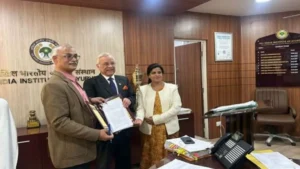In a groundbreaking partnership, Nokia and the Indian Institute of Science (IISc) have united to pioneer 6G technology research and its real-world applications, with a particular focus on India. This collaboration, headquartered at Nokia’s newly inaugurated 6G Lab in Bengaluru, will delve into various facets of 6G technology, from radio technologies to architecture, while integrating machine learning into the 6G air interface.
Research Focus Areas
- 6G Radio Technologies: Delve into advanced radio technologies to lay the groundwork for the next generation of wireless communication.
- 6G Architecture: Explore novel architectural designs that will define the infrastructure of future wireless networks.
- Machine Learning Integration: Investigate the integration of machine learning techniques into the 6G air interface, enhancing its efficiency and performance.
Targeted Objectives
- Relevance to India: Tailor research efforts to ensure that 6G technology developments align with the specific needs and challenges of India.
-
Sustainability and Energy Efficiency: Develop communication systems that are more sustainable and energy-efficient, contributing to environmental conservation efforts.
- Resilience and Reliability: Enhance the resilience and reliability of communication networks, particularly for critical applications such as emergency services and disaster response.
-
Network as Sensor: Leverage AI and ‘Network as Sensor’ technologies to enhance transportation safety, healthcare accessibility, and educational opportunities.
Milestones and Initiatives
-
Establishment of the 6G Lab: In October 2023, Nokia inaugurated the 6G Lab at its Global R&D center in Bengaluru, aiming to expedite the development of fundamental technologies and innovative use cases for 6G.
-
Academic Collaboration: Foster collaboration between Nokia and educational institutions, including IISc, to facilitate knowledge exchange and academic advancement in the field of 6G technology.




 India and Sweden Deepen AI Partnership T...
India and Sweden Deepen AI Partnership T...
 Why the Adani-Marseille Pact Could Be a ...
Why the Adani-Marseille Pact Could Be a ...
 AIIA Signs MoU with General Insurance Co...
AIIA Signs MoU with General Insurance Co...








